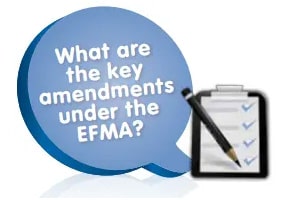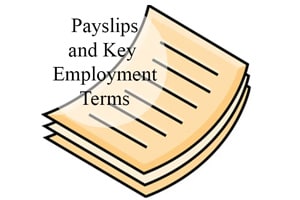Human Resource and Immigration in Singapore
This page provides detail information about Employment and Human Resource in Singapore. The information is presented in the form of short articles on various topics that are organized in categories below.
This post is also available in:
![]() 简体中文 (Chinese (Simplified))
简体中文 (Chinese (Simplified))
This page provides detail information about Employment and Human Resource in Singapore. The information is presented in the form of short articles on various topics that are organized in categories below.

Guide to Hiring Staff in Singapore
Now that you have successfully been able to incorporate a Singapore company, you are ready to begin hiring employees. Continue reading →

Amendments to the Employment of Foreign Manpower Act
The amendments to the Employment of Foreign Manpower Act or EFMA will kick in with effect from 9 November 2012. Continue reading →

Issue Itemised Payslips and Key Employment Terms to Employees
From 1st April 2016, employers will be required to issue itemised payslips and Key Employment Terms (KETs) to their employees. Continue reading →
Visa and Work Pass
The Ministry of Manpower (MOM) is Singapore’s main authority for working in Singapore. MOM requires all foreigners who wish to work in Singapore to obtain a Work Pass before commencing any form of work. Continue reading →
How to Migrate to Singapore
Your journey to citizenship begins with an employment pass. The EP gives you permission to work in Singapore. Continue reading →
The Comparison between Employment Pass and EntrePass
Although both passes share many similarities as described above, the passes have some crucial differences and varying factors that determine which types of work pass suits the applicant. Continue reading →
Singapore’s Dependent Pass Scheme for Family Members
For a DP holder, their status for the duration of their stay in Singapore is inherently tied to that of the main work pass holder. So long as the work pass holder continues to remain, work and live in Singapore, the DP holders are eligible to live as well. DP holders are also able to leave and return to Singapore freely without having to apply for a new visa again at each trip. Continue reading →
Employee Benefits in Singapore
In accordance with the Singapore Employment Act, common practices are applied to employment contracts, wages, and benefit plans that reward and recognize the best company employees. If applied properly, employee benefits can successfully raise the productivity levels of an employee and retain the employee for a long period of time in the company, which in turn would have a positive outcome when it comes to the bottom line. Continue reading →
Statutory Childcare Leave in Singapore
Childcare leave is designed for parents to spend time with their children on the occasions that they need it the most. For example, parents are able to utilize this leave when they need to look after their child because the child is sick, bring the child for the required health checkups or accompany a child for the first day of school. Continue reading →
Summary of Employment Laws in Singapore
The Employment Act (EA) in Singapore outlines the basic terms and conditions of employment, statutory requirements employers must comply with as well as the rights and responsibilities of employers and employees under a contract of service. The Singapore Employment Act is the main labour law that protects the rights and outlines the responsibilities and statutory requirements of both employee and employer. Continue reading →
Jobs Bank in Singapore
The digital age has revolutionized the method of recruitment as well as the way of job hunting. The online job portals have revolutionized the traditional hiring process where they become an important source for both job seekers and the recruiters. The reason is simple: online job portal is a fast and convenient platform that enables the employer to post job vacancies while job seekers can directly apply for their desired positions. Continue reading →
Singapore’s Ministry of Manpower (MOM)
The Ministry of Manpower in Singapore is commonly known by their abbreviation MOM. Since its establishment, MOM has been the ministry of the Government of Singapore that has been responsible for the formulation and implementation of the labour policies related to the workforce in Singapore. Continue reading →
Can Employment Pass Holder Be the Director in Singapore?
Many people have been asking this question: “Can the Employment Pass (“EP”) holders take up secondary directorship appointments?” Continue reading →
Singapore Immigration Schemes and Requirements
Singapore is fast becoming the ideal business hub in Southeast Asia due to its immigration policies that attract foreign professionals from across the globe. There are various work permit schemes, Singapore immigration schemes available in Singapore for foreign talents and seasoned entrepreneurs. Continue reading →
Employment Pass (EP) Online
Any employer of employment agency can utilize the EP Online system for Employment Pass and S Pass related matters. EP Online can be used to apply for Employment Pass and S Pass visas, checking the status of this visas, issuing these visas, renewals and even cancellations. Continue reading →
A Guide to Foreign Worker Tenant Enquiry Service (FWTES)
The Foreign Worker Tenant Enquiry Service (FWTES) allows you to check how many foreign workers are occupying either a HDB flat or a PRP (Private Residential Premise) in Singapore. Continue reading →
Singapore’s Employment Act Updates 2019
Singapore’s local and foreign employees are covered under the Employment Act. This law was enforced in 1968. It was put in place to protect the rights of the workers. Since then, it has undergone several changes which include mandatory wage slips and benefits for the employees which include paid sick leave and mandatory annual leave. Continue reading →
Path to Singapore PR Via the Singapore Global Investment Programme
If you intend to apply for a permanent residency (Singapore PR) in Singapore, the Global Investor Programme (GIP Scheme) might be the pathway for you. Continue reading →
Central Provident Fund – CPF Contribution Rates in Singapore
The Central Provident Fund (“CPF”) is the comprehensive social security savings plan in Singapore. As the name implies, CPF helps working Singaporeans to build their retirement savings via lifelong income, healthcare financing and home financing. Continue reading →
Singapore PR Schemes – An Overview
Singapore has a range of schemes to assist foreigners from a range of backgrounds to come and set up a home in the country. However, not all applicants will undergo the same Singapore PR process. Eligible applicants include individuals, their spouse and their unmarried children under the age of 21. Continue reading →
The Benefits of Having a Singapore Permanent Residence (PR) Status
There’s a reason why foreigners have, for years, been keen to become a Singapore Permanent Resident (PR), and that’s because of the benefits they stand to gain. Continue reading →
Guide to Singapore Permanent Residence PR Application for Beginners
For foreigners who are keen on calling Singapore home, this guide to Singapore Permanent Residence application (Singapore PR application) for beginners will tell you everything that you need to get started. Continue reading →
Guide to Calculate Foreign Worker Quota in Singapore
The service sector foreign workforce in Singapore will face a cut in quota over the next two years. In the move to manage the manpower growth in service sector and encourage employers to deploy human resources efficiently. Continue reading →
Singapore Employment Practices
The article gives you a general introduction to the statutory requirements as stipulated in the Singapore Employment Act and common employment practices that cover employment contracts, salaries, public holidays, benefits… Continue reading →
Tripartite Guidelines on Fair Employment Practices (TAFEP)
The Tripartite Guidelines on Fair Employment Practices (TAFEP) and advisories are the competitive advantages to the employment setting in Singapore that provides frameworks, benchmarks and recommendations for employers… Continue reading →
Guidelines for Workplace Unfair or Wrongful Dismissal in Singapore
Workplace disputes can sometimes result in dismissal or termination. Find out if you are wrongfully dismissed by your employer and what to do about it… Continue reading →
Paternity Leave in Singapore
Working fathers will not be entitled to two weeks of paid paternity leave in Singapore which will be funded by the Singapore government beginning 1 January 2017… Continue reading →
Singapore Tourist Visa
Tourists intending to visit the island state will require a Singapore tourist visa in some cases, although there are certain countries where tourists can visit the country without a visa…. Continue reading →
Dual Citizenship is Disallowed in Singapore
Dual Citizenship is Disallowed in Singapore. Citizenship is a sense of belonging for an individual to a country, implying loyalty to the country at all times. Citizens of countries around the world enjoy the benefits of being part and parcel of the country they were born, bred and reside in…. Continue reading →
Immigration and Checkpoints Authority (ICA Singapore)
Singapore’s Immigration and Checkpoints Authority (ICA Singapore) is the country’s border control agency department within the Ministry of Home Affairs… Continue reading →
MediSave Contribution for Self-employed Individuals
In Singapore, the Medisave is a national medical savings scheme that helps Central Provident Fund (“CPF”) members to set aside a portion of their income into their Medisave Accounts to meet their future healthcare expense, be it personal or the immediate family… Continue reading →
Singapore PR Status Check Online of Your Singapore PR Application
Become a Singapore PR status is the intermediary step before you become a Singapore citizen. Checking the status of your Singapore PR can be done via the Singapore Immigration and Security Checkpoints Authority (ICA)’s portal… Continue reading →
A Guide to Singapore Company Employee Handbook
Every business owner is going to have to prepare a Company Employee Handbooks (unless you’re a sole proprietorship that is). This handbook helps to set the foundation for what the professional working relationship should be between an employer and an employee in the company… Continue reading →
“No Show” Employees – What Singapore Companies Can Do?
An employment contact is a signed agreement between a company and an employee hired for their role. But what happens when that employee fails to turn up for work? These “no show” employees are the ones who fail to turn up for work without informing anyone of their absence the way that are required to do… Continue reading →
Singapore Public Holiday Guides
The Singapore Public Holiday Guides will discuss the major public holidays and festivals you will enjoy celebrating in Singapore. The Singapore Government announces that there are about 10 public holidays every year in Singapore based on important religious and cultural (historical) dates. Additionally, the Ministry of Manpower oversees the Employment Act of Singapore, according to which, employees must get a paid day off in during those days… Continue reading →
A Guide to Working in Singapore As a Part-Time Employee
Part-time employees in Singapore are part of the local workforce, whether they are locals or foreigners employed in the role. Effectively, any person who works 35 hours or less per week and under an employment contact is considered a part-time employee in Singapore as per the local law… Continue reading →
Guide to Terminating or Retrenchment Employees in Singapore
The termination of employment relationship occurs for many reasons, be it due to voluntary agreement between both parties (employer and employee), or by dismissal with (or without) termination notice. For dismissal cases, the employer has to make sure the dismissal decision is made without violating certain preconditions for the MOM termination to be legitimate and reasonable… Continue reading →
Singapore’s Work Injury Compensation Act 2019 Updates
The Work Injury Compensation Bill 2019 was passed in Parliament on 3 September 2019. The new Work Injury Compensation Act (“WICA”) 2019 will offer the following benefits to both employers and employees and will take effect from 1 September 2020 to allow employers and insurers time to adjust influence companies to prevent injuries from happening in the first place, faster and simpler claims processes for everyone, enhanced protection for employees, and more certainty for employers… Continue reading →
Employee Stock Option Plan (ESOP) in Singapore
Employee Stock Option Plan (“ESOP”) is one of the additional incentives that a company can offer, which is also a popular type of employee compensation that could win the race. ESOPs are powerful incentives as part of the staff remuneration package to retain talents, boost staff morale, and create a sense of belonging among employees. Continue reading →
How to Write a Resignation Letter
Everything that start will eventually come to an end. With regards to ending a job, it is necessary for employees to write a resignation letter. The ability to compose a professional and well-thought resignation letter is useful in the long run and will serve as a good reminder of how far you’ve come in your career. Continue reading →
Changes to Retirement Age in Singapore
The mandatory retirement age in Singapore is currently 62 years old. However, the Prime Minister of Singapore announced on August 18, that the retirement and re-employment age will be increased to 65 and 70 respectively by 2030, alongside increases in the Central Provident Fund (CPF) contribution rates for older workers. Continue reading →
Information on Singapore Employment Pass
The Singapore Employment Pass is required for foreign professionals who intend to work in Singapore. The applicant must meet the criteria to apply for the pass. Furthermore, only an employer or authorised third party can apply for a Singapore Employment Pass on behalf of a candidate. Continue reading →
Work Passes and Permits in Singapore
Singapore is a profoundly grown free-market economy. Singapore draws in a considerable measure of foreigners because of the high salaries, great job opportunities and a great tax system. In this way, drawing in seasoned entrepreneurs and working professionals from around the globe. Work Passes and Permits are required before one can begin working in Singapore. Continue reading →
A Guide to Successfully Performing an Employee Onboarding Process
Employee onboarding is the procedure whereby new employees are introduced to their job and acquire the necessary tools and knowledge to become effective organizational members. The onboarding process is also important in employee retention and overall performance.
The productive workforce of a nation is what makes up the economic situation. Generally, a productive workforce is made up of the age group between 20 – 40 year-olds. But, as the birth rate in Singapore drops, there are more senior employees in the workplace.
A Quick Guide to Housing Rental in Singapore
Expats intending to work and live in Singapore will need to focus on something else besides starting a business. Their housing and rental situation.

